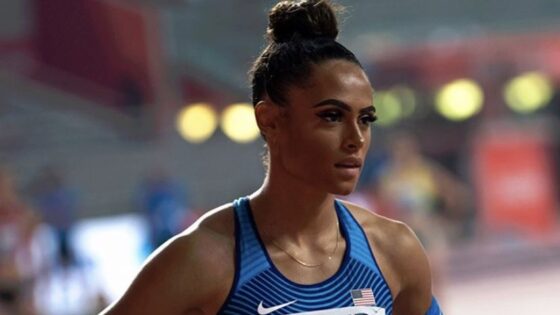The league collapsed before the finish line. The headlines screamed failure. Critics rushed in with “told-you-so” takes. But while Michael Johnson’s ambitious Grand Slam Track (GST) experiment hit a wall in its debut season, one voice, clear, calm, and confident, refused to join the pile-on: Sydney McLaughlin-Levrone. Just days after Michael Johnson’s Grand Slam Track (GST) league abruptly pulled the plug on its inaugural season, citing $2 million in projected losses and low ticket sales, but Sydney didn’t turn her back. She stood by it.
Well, we know she wasn’t just some late entry; they built the league around her. Sydney was the very first “Racer” signed when GST launched in 2024. Johnson, a legend himself, said at the time he wanted to reinvent track and give athletes more spotlight, more money, and more freedom. For Sydney, it wasn’t just hype; she even took on the rare challenge of racing both the 400m hurdles and the 400m flat. It was risky. It was exciting. It worked for a short time. But not even Sydney’s star power could outrun the numbers. As Michael Johnson’s GST buckled under financial strain, she showed up, smiling, waving, and saying exactly what few others dared to.
Recently, Grand Slam Track shared a photo of Sydney McLaughlin-Levrone on X, along with her powerful message of support, words that stood out amid the league’s uncertain future: “I think it’s just bringing so much excitement to the sport. I can see this being something that in years to come people are going to want to join. I understand it’s new. There’s a lot of questions around it, but I think each one is just getting better and better and the times are getting faster and faster. It’s just a great opportunity for the sports, for track, and for the athletes.” And it makes sense.
This is bigger than one season.
Sydney shared how Grand Slam Track could change the sport for years to come. pic.twitter.com/eqqwnojDDn
— Grand Slam Track (@GrandSlamTrack) June 20, 2025
In a world where athletes often play it safe, this was different. Sydney McLaughlin-Levrone wasn’t just a competitor; she was defending the vision. She earned approximately $200,000 during the 2025 Grand Slam Track season, winning $100,000 each at the Kingston and Miami meets, where she dominated the women’s long-hurdles group (400m hurdles + 400m flat). At the third meet in Philadelphia, she attempted the 100m/100m hurdles combo but finished off the podium, earning no prize money. But it has to end.
Despite viral clips and high-octane showdowns, Grand Slam Track (GST) struggled to pull in crowds or sponsors fast enough. The final meet in Los Angeles? Canceled. Athletes? Notified over Zoom. Michael Johnson called it a “business decision,” insisting the shutdown was painful but necessary: “What’s most important is the future and sustainability of the league.” The backlash online was swift; some fans called it a flop, others labeled it “unreliable.” On Reddit, athlete feedback turned sour after the sudden cancellation: “This was a bad move by MJ. … Trust was broken with the fans and the GST competitors, whom were likely relying on that base pay of $10 k.” But Sydney McLaughlin-Levrone?
Sydney McLaughlin-Levrone stayed loud and loyal. To her, GST isn’t a failure; it’s the first draft of what track could become more daring, more rewarding, more now. So what happens next? Next season??
Sydney McLaughlin-Levrone believes in the vision, but is that enough to get GST to 2026?
Michael Johnson’s Grand Slam Track (GST) was forced to scrap its Los Angeles finale on 28‑29 June after the UCLA deal turned “financially unviable,” with projected losses topping $2 million. Organizers admitted ticket sales were slow, while sponsorship and broadcast revenue never reached lofty targets; pulling the plug saved roughly $2.5‑3 million in prize money and travel costs. Behind the scenes, some athletes still hadn’t received full appearance checks, underlining cash‑flow strains in a start‑up that had budgeted a hefty $12.6 million prize pool for just four meets.
Michael Johnson framed the early shutdown to preserve the future of the league and stressing that the decision to conclude the inaugural Grand Slam Track season is not taken lightly… but one rooted in a belief that we have successfully achieved the objectives we set out to in this pilot season and the importance of looking towards 2026 and beyond. So, is there a Season 2?
GST says yes, 2026. A new marquee sponsor is slated to be announced “next week,” and a fresh investor slate already features billionaire Robert F. Smith and Sundial Brands founder Richelieu Dennis; organizers insist the added capital will underwrite a tighter, better‑promoted circuit next year. Spokesperson Callum Squires told Canadian Running the L.A. cancellation was “a difficult choice” that lets GST “set our sights on 2026,” with a revamped schedule under discussion.
Athletes remain split. Kenny Bednarek, who banked $ 400k in GST prize money, called the hiccup “growing pains” and added, “The future is bright… next year they’re going to come back stronger.” Skeptics doubt sponsors will re‑up after a shaky debut, but Johnson’s team argues the league has proved demand for bigger paydays and athlete‑first storytelling, and that 2025’s lessons will shape a leaner, financially safer Season 2.
Bottom line: Michael Johnson’s GST did not meet the lofty expectations this year because revenue and attendance lagged far behind its ambitious cost structure, especially the pricey L.A. leg. Yet new money is on the way, organizers are openly targeting a 2026 relaunch, and key athletes like Bednarek (and defender‑in‑chief Sydney McLaughlin‑Levrone) say they’re sticking around to see if a stronger, more sustainable version finally clears the bar.
The post Sydney McLaughlin-Levrone Jumps into Defense After Track and Field League Faces Criticism appeared first on EssentiallySports.
